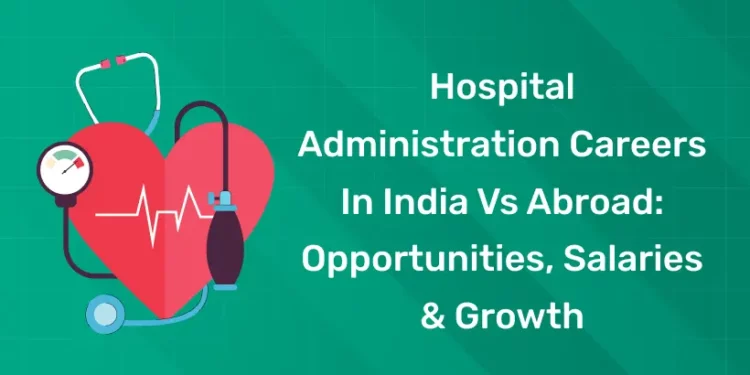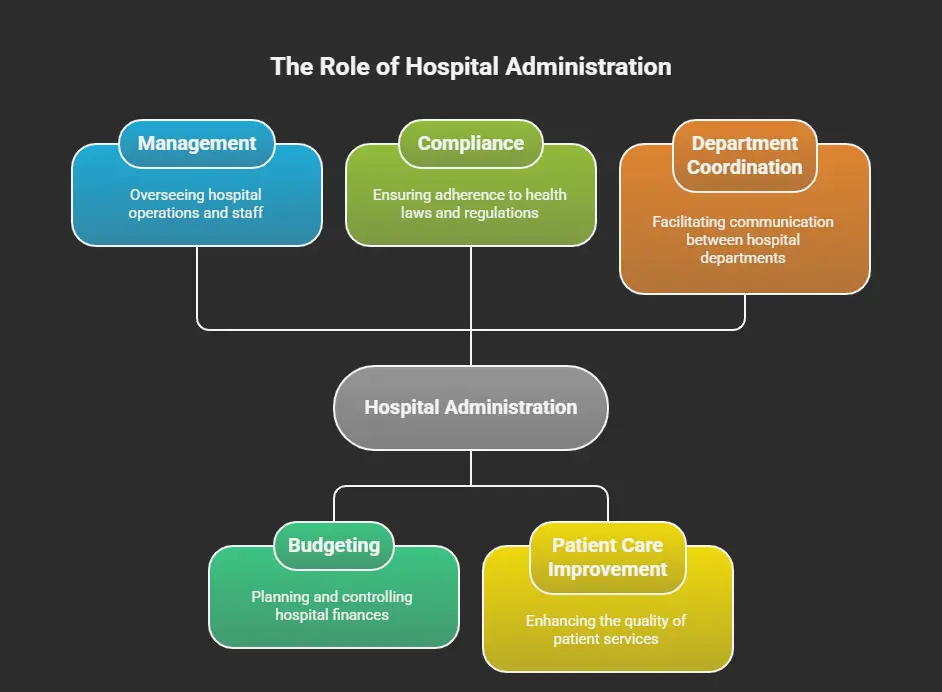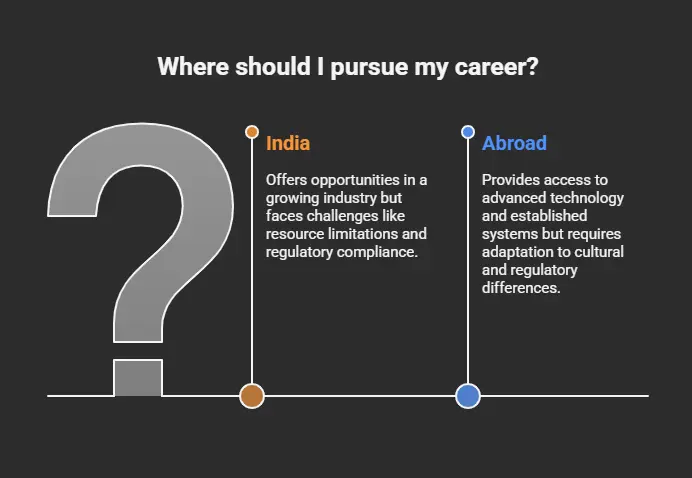Table of Contents
The field of hospital administration is expanded rapidly, both in India and globally, as the healthcare system becomes more complicated and the demand for effective management is increasing. In search of effective professionals to supervise operations, finance and patient care services with hospitals and health services, career opportunities in the region are stronger than ever. However, scope, salary and development potential in India can be much different from abroad. Understanding these differences will help hopeful professionals to choose the right way for their careers in the healthcare system.
Explore Your Future in Hospital Administration! Enroll now
Introduction
The demand for skilled professionals in the hospital administration increases as the healthcare system becomes more advanced. Hospitals are not just the treatment centers – they are complex organizations that require strong leadership, planning and management to function evenly. It has opened exciting career opportunities for those who want to work in the healthcare system without directly involving clinical roles.
When it comes to building a career in the hospital administration, many candidates wonder if they will stay in India or find opportunities abroad. While the two countries offer rewarding opportunities, they are different in terms of wages, jobs and long-term development. Understanding these differences will help you make more informed decisions to make a career in the healthcare system.
Overview of Hospital Administration as a Career:
1: What is the primary role of a hospital administrator?
The hospital administration is one of the most promising career paths in health services. Unlike doctors and nurses, who offer direct patient care, hospital administrators work behind to ensure that health facilities go smoothly, effectively and ethically. They handle management, coordination and supervision of hospitals, clinics, nursing homes and other health organizations.
What Does a Hospital Administrator Do?
A hospital administrator is responsible for a wide range of tasks, for example:
- Hospital operations and staff management.
- Planning budget and controlling costs.
- To ensure that a hospital follows the health law and rules.
- Improves patient treatment services and the efficiency of total hospitals.
- Coordination between different departments such as finance, human resources and medical personnel.
Simply put, administrators work as leaders and problem dominants that ensure that hospitals provide quality care while remaining economically and legally stable.
Why choose Hospital Administration as a career?
Career is attractive as it combines health services, management and management. People entering this field can have a real effect on patient care without self-medical professionals. It also gives:
- High demand – with health services rapid expansion is effective administrators continuously required.
- Various opportunities – jobs are available in hospitals, clinics, state health departments, voluntary organizations, insurance companies and even pharmaceuticals.
- Development ability – Experienced professional hospital directors, CEOs or health care can continue to senior roles as an advisor.
Skills Needed for Success
To succeed in this career, professionals require strong management, communication, problem-solving, financial management and organizational skills. A good hospital administrator balances the efficiency of compassion and ensures that both staff and patients are supported.
Hospital Administration Course with Assured Career Growth
Hospital Administration Course by Entri App: Master essential healthcare management skills, gain certification, and secure top roles in leading hospitals
Join Now!Hospital Administration Careers in India
The health service sector in India is growing rapidly due to an increasing population, lifestyle changes and increasing demand for high quality medical services. Together with doctors and nurses, there is a strong requirement for skilled hospital administrators who can effectively manage health facilities. As a result, the hospital administration has become one of the most promising non-clinical career
Scope and Opportunities:
Hospital administrators in India play an important function within the management of hospitals, nursing homes, clinics or even healthcare projects. They are responsible for preserving operations, managing employees, making sure compliance with health services and enhancing patient services. With the growth of private hospitals, occupational health services and medical tourism, career opportunities in the field are continuously expanded.
The common roles available in India include:
- Hospital Administrator/ Manager – Managing daily operations and resources.
- Department Head – Leading specific areas like HR, finance, or patient services.
- Healthcare Project Manager – Overseeing new hospital projects or expansions.
- Medical Superintendent (Non-clinical role in some hospitals) – Ensuring policies and standards are followed.
Salary in India:
Hospitals in India vary depending on the salary, experience and type of health organization for administrators.
- Entry-level professionals: ₹3 – ₹5 lakhs per year.
- Mid-level managers: ₹6 – ₹12 lakhs per year.
- Senior administrators/directors: ₹15 lakhs per year or more, especially in private or corporate hospitals.
Medical tourism and major health services such as Apollo, Fortis and Max Healthcare provide opportunities for higher wage packages and development compared to smaller facilities.
Growth Prospects:
The future of hospital administration careers in India seems very bright. Ayushman Bharat will play an important role in integrating administrative technology, improving patient care and managing health services, with government initiatives in India and the emergence of telemedicine and digital health. Professional top management positions with international certificates or advanced degrees (example: MHA or MBA in health services) can be transferred.
Hospital Administration Careers Abroad
A career in hospital administration abroad is considered one of the most rewarded non-clinical roles in the healthcare system. As the healthcare system is more advanced worldwide, the need for skilled professionals who can manage hospitals and health services increases networks. Countries such as the United States, the United Kingdom, Canada, Australia, Germany and the Gulf Nations provide good opportunities for qualified administrators with strong management and leadership skills.
Scope and Opportunities
Hospital administrators abroad are not just the head of daily operations-they often work as strategic managers. They are responsible for integrating technology into financial planning, implementation of policy, employee management, patient services and healthcare. Many administrators work at the senior level, managing the entire hospital or even health services.
Career opportunities include roles such as:
- Healthcare Administrator/ Executive – Leading hospital departments or full facilities.
- Operations Manager – Overseeing staff coordination and operational efficiency.
- Health Services Manager – Managing healthcare delivery at regional or national levels.
- Healthcare Consultant – Advising hospitals and health organizations on performance and compliance.
Salaries Abroad
One of the main attractions of working abroad is the salary ranges. Professionals in this field earn much more than India.
- USA: $70,000 to $120,000 per year (₹55 – ₹95 lakhs approx).
- UK: £40,000 to £70,000 per year (₹40 – ₹70 lakhs approx).
- Canada & Australia: CAD 60,000 to 100,000 annually (₹35 – ₹60 lakhs approx).
- Gulf nations (UAE, Saudi Arabia, Qatar): ₹30 to ₹60 lakhs per year, often tax-free with benefits like housing and travel.
These salaries reflect not just the higher cost of living but also the advanced level of responsibilities and expectations abroad.
Growth Prospects
Hospital administrators abroad enjoy the growth of strong careers. With experience, they can continue to positions as Director of hospitals, Chief Executive Officer (CEO), or Policy Advisor in government or international health organizations. Many countries also emphasize digital health, medical technology and data-driven governance, even more specific career paths.
Explore Your Future in Hospital Administration! Enroll now
Hospital Administration Careers in India vs Abroad: Educational Qualifications
In order to make a career in the hospital administration, the right educational background is very important. The field requires a mix of management knowledge and understanding of the healthcare system, so most programs are designed to develop both skills. Depending on the level of role, you will advance the entry-level, mid-level or management requirements with different qualifications.
Undergraduate Level:
At the bachelor’s level, students can pursue:
- Bachelor of Hospital Administration (BHA)
- Bachelor of Business Administration (BBA) in Healthcare Management
- Bachelor’s in Public Health or Life Sciences (with additional specialization)
These programs provide a foundation in healthcare systems, management principles, and hospital operations.
Postgraduate Level:
For higher-level roles, a postgraduate degree is often preferred or required. Popular options include:
- Master of Hospital Administration (MHA).
- MBA in Healthcare Management.
- Master of Public Health (MPH).
- Postgraduate Diploma in Hospital and Health Management.
These programs focus on advanced topics like strategic leadership, healthcare finance, policymaking, and organizational development.
Specialized Certifications
Along with degrees, professionals can enhance their career prospects with certifications such as:
- Certified Healthcare Administrator (CHA).
- Diploma/ Certificate in Hospital and Health Services Management.
- International certifications (offered by the institutions in the USA, UK, or Canada) in the field like health informatics, patient safety, or healthcare quality management.
Eligibility Criteria
- For undergraduate programs: Students usually have to complete sslc, plus two with a science, commerce or art background.
- For postgraduate programs: Students should complete bachelor’s degree is necessary in healthcare, life science, business or related fields. Some universities may also request an entrance exam or work experience.
Hospital Administration Course with Assured Career Growth
Hospital Administration Course by Entri App: Master essential healthcare management skills, gain certification, and secure top roles in leading hospitals
Join Now!Hospital Administration Careers in India vs Abroad: Salary Comparison
To make a career in India or abroad, salary is often one of the important considerations. While both provide rewarding opportunities, the earning capacity for hospital administrators can be very different based on the location, qualification and responsibilities.
Salaries in India
In India, the typical salaries in the hospital administration may vary depending on the type of hospital, city and experience of candidates.
- Entry-Level Professionals (fresh graduates or with less than 2 years of experience) earns ₹3 to ₹5 lakhs per year.
- Mid-Level Managers (5 to 10 years of experience) earns ₹6 to ₹12 lakhs per year.
- Senior Administrators/ Directors may earn up to ₹15 lakhs or more per year, especially in the large corporate hospitals and medical chains.
Some private hospitals such as Apollo, Fortis, Max and Manipal usually pay more according to small hospitals. The emergence of medical tourism and health services for companies also increases their salary level in other cities such as Delhi, Mumbai, Bangalore and Chennai.
Salaries Abroad:
Salaries abroad are quite high, which reflects advanced healthcare and high living costs.
- In USA health administrators may earn $70,000 to $120,000 annually (₹55 – ₹95 lakhs approx).
- Countries like UK, the health administrators may earn £40,000 to £70,000 annually (₹40 – ₹70 lakhs approx).
- In Canada & Australia, they earn CAD 60,000 to 100,000 annually (₹35 – ₹60 lakhs approx).
- Gulf Countries like (UAE, Saudi Arabia, Qatar) health administrators earn ₹30 to ₹60 lakhs annually, often tax-free with additional benefits like housing, travel allowances, and medical coverage.
These roles usually require more advanced degrees such as MHA, MBA or international certificates in the healthcare system with strong experience.
Key Takeaway:
- In India, the hospital administration has provided stable and increasing salaries with rapid career development opportunities in the healthcare system.
- Although in Abroad salaries are very excessive, and professionals often enjoy extra perks, but the entry is more competitive and requires advanced qualifications.
Career Growth Opportunities
Hospital administration is not just a stable career – it is also a region with strong growth capacity. As the healthcare systems expand and develop, administrators can continue from entry level roles to senior level control positions. The development path may rely upon factors including training, experience, abilities and whether someone chooses to work in India or abroad.
Career Growth in India
In India, the health care system is growing rapidly with private hospitals, medical chains, government health initiatives and the emergence of medical tourism. This growth creates opportunities for hospital administrators to continue their careers.
- Entry Level Roles: The entry level roles may include, assistant administrator, Management Trainee or branch coordinator.
- Intermediate level roles: Intermediate roles may include hospital manager, operations manager or department head (finance, human resources or patient care).
- Senior roles: Senior roles include the Director of Hospital, Head of Operating Officer (COO) or CEO (CEO).
Professional, which follows advanced qualifications such as MHA, MBA in the healthcare system or international certificates, is more likely to continue in top management positions.
Career Growth Abroad
In countries such as the United States, the United Kingdom, Canada, Australia and Gulf Nations, hospital administrators enjoy the growth of structured careers with high salaries and more advanced responsibility. Career progress is often involved:
- Health Services Manager – Their role is managing a single department or unit.
- Hospital Administrator / Executive – Overseeing the hospital operations and staff.
- Regional Manager / Director – They lead multiple hospitals or healthcare services within a network.
- C-Level Positions – To become a COO, CEO, or policy advisor in government or global health organizations.
Abroad, there is also more emphasis on special roles such as the health care system’s management, quality assurance and digital health management, which opens further development paths.
Future Trends Driving Growth:
- Digital Health & Telemedicine, administrators with knowledge of technology will see more opportunities.
- Medical tourism, especially in India and the Middle East, will create demand for skilled administrators in international health care standards.
- The expansion limits of the global health care system and participation will open opportunities for administrators with international risk.
Challenges in India vs Abroad
While the hospital administration rewards career opportunities, professionals depend on whether they work in India or work abroad. Understanding these challenges can help hopeful administrators to better prepare for career paths.
Challenges in India
- Resource Limitations: There is a lack of employees, equipment and infrastructure, especially in many hospitals in India, especially in rural areas. Administrators often need to find creative ways to handle limited resources by providing quality care.
- Balancing Cost and Quality: India has a diverse population with a diversity level. Hospital administrators should balance the healthcare system by ensuring high treatment standards and keeping health services cheap.
- Regulatory Compliance: The healthcare regulations, licensing and continuously updated recognition requirements present a challenge. Administrators should remain up to date and ensure that the hospital follows all rules.
- Managing a Growing Industry: The quick expansion of private hospitals and medical tourism creates opportunities, but it also increases competition. Administrators require strong strategic skills to help their outfits stand out.
Challenges Abroad
- High Competition: In countries such as the United States, the United Kingdom and Canada, the healthcare system is already an established profession. To achieve a role, advanced qualification, international certificate and previous experience often require.
- Difference in culture and system: Each country has its own Cultural expectations, health policies,and insurance systems. Administrators who work abroad must quickly adapt to unknown systems.
- Strict Regulations: Health services abroad are strongly regulated. Administrators face the challenge of maintaining compliance with strict standards related to patient safety, privacy and insurance.
- Work Pressure and Expectations: Hospitals abroad work with advanced technology and large-scale systems. Although it provides resources, it also brings high responsibility and pressure to meet the performance goals.
Explore Your Future in Hospital Administration! Enroll now
Conclusion
The hospital administration provides exciting career opportunities in both India and abroad, but experiences can be very different. In India, the field is growing rapidly with the rise of private hospitals, the healthcare system’s chains and public health programs, making it a stable and impressive career alternative. Abroad, professionals often enjoy high salaries, advanced resources and international risk, although competition and profit requirements can be difficult.
The best option depends on your career goals, financial expectations and the desire to work in different health environments. Whether you choose to make a career in India or find out opportunities abroad, the hospital administration gives a chance to create a real difference in development, respect and healthcare.
Hospital Administration Course with Assured Career Growth
Hospital Administration Course by Entri App: Master essential healthcare management skills, gain certification, and secure top roles in leading hospitals
Join Now!Frequently Asked Questions
Is hospital administration a good career option in India?
Yes, hospital administration is a growing career in India. With the rise of private hospitals, government health programs, and medical tourism, the demand for skilled administrators is increasing. It offers stability, career growth, and the chance to contribute to improving healthcare delivery.
What is the average salary of a hospital administrator in India?
In India, entry-level hospital administrators earn around ₹3 – ₹5 lakhs per year. Mid-level managers earn ₹6 – ₹12 lakhs, while senior professionals in large corporate hospitals can earn ₹15 lakhs or more annually.
How much do hospital administrators earn abroad?
Salaries abroad are much higher compared to India. In the USA, hospital administrators typically earn $70,000 – $120,000 per year. In the UK, salaries range from £40,000 – £70,000. In Canada and Australia, it can be CAD 60,000 – 100,000 annually. In the Gulf, salaries are usually between ₹30 – ₹60 lakhs per year, often tax-free.
What qualifications are required to work in hospital administration abroad?
Most countries require advanced qualifications such as a Master of Healthcare Administration (MHA), MBA in Healthcare, or equivalent certifications. Additionally, strong English language skills and relevant work experience are often necessary to secure opportunities abroad.
Are career opportunities better in India or abroad?
Both have advantages. In India, the industry is expanding rapidly, creating many opportunities at different levels. Abroad, opportunities may be fewer but are often higher-paying and more specialized. The choice depends on whether you value local growth and stability or global exposure and higher salaries.
Can Indian hospital administrators get jobs abroad easily?
It is possible, but not always easy. Candidates need internationally recognized qualifications, strong experience, and sometimes country-specific licenses or certifications. Networking and applying through global healthcare organizations can improve chances.
What are the growth prospects in hospital administration?
In both India and abroad, professionals can grow into senior roles like Hospital Director, Chief Executive Officer (CEO), Healthcare Consultant, or Policy Advisor. The growth is faster for those with strong management skills and advanced degrees.
Which is better for fresh graduates: starting in India or going abroad?
For fresh graduates, starting in India can be a good option to gain basic experience and practical exposure. Once you build a strong foundation, you can pursue higher studies or certifications abroad to unlock global opportunities and higher-paying jobs.













